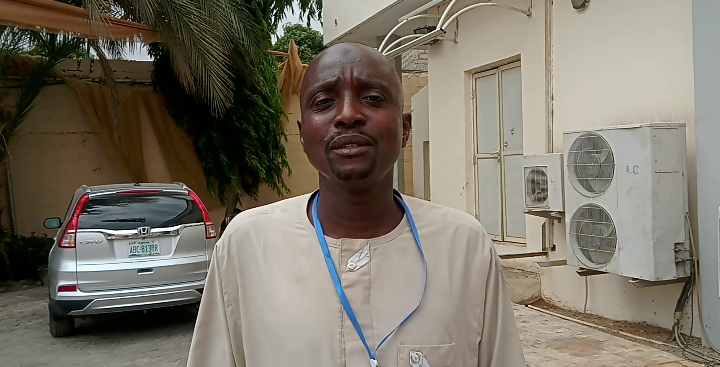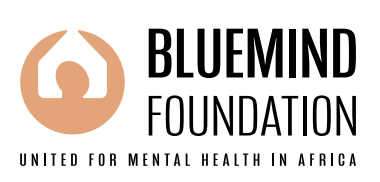SOJO | How YAFODA is tackling drug abuse in northern Nigeria
The Youth Awareness Foundation on Drug Abuse (YAFODA), a Kano-based non-profit focused on rehabilitating and reintegrating drug addicts back into society, has successfully rehabilitated thousands of youth drug abusers and reunited them with their families across northern Nigeria and the Niger Republic.
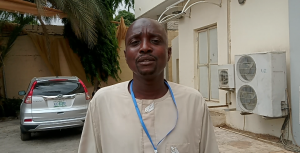
By Adam Alqali & Stephen Enoch
Born with a silver spoon, Abubakar Tijjani’s upbringing was akin to a bed of roses; growing up in absolute comfort could have led to his carefree life, eventually pushing him into the use of illicit drugs. As a fifteen-year-old, Tijjani felt like a reigning king in his social circle of fellow teenage drug abusers. Little did he know that his future would be a stark contrast to the happy-go-lucky life he was living at the time.
Tijjani, 36, started abusing drugs in his first year at Government Secondary School (GSS) Karaye, in Kano state, one of over a hundred unity schools spread across Nigeria. Thanks to his affluent background, he could easily afford assorted drugs for himself and his friends throughout his days at GSS Karaye.
The now reformed addict who said drugs and not education was his priority in his school days, barely managed to graduate from secondary school but could not qualify for admission into the university so had to opt for a Federal College of Education (FCE) – from where he would drop out after spending 4 years due to his incessant abuse of drugs.
“I was always skipping classes and would instead be clubbing and enjoying my life. I later got admitted into the Bayero University Kano (BUK), where I again dropped out after another 4 years. My parents were so sad and dejected and thought changing my location would help me stay off drugs,” he recalls.
Due to his parents’ persistence, Tijjani secured admission into the Federal Polytechnic, Damaturu, Yobe state. Yet his addiction only got worse, such that if he didn’t take drugs for a day he would feel as if he was running mad.
“There was a day I couldn’t get my supply and began shivering like a convulsing baby about to die. I only got back to normal after taking my drugs. I had become badly addicted to Cannabis, Tramadol, and Codeine Syrup. There was a time I spent N600,000 on drugs at a time! And when I didn’t have money, I would steal from my father’s safe to get the drugs.’’
After wasting many years in school, Tijjani’s parents gave up on sponsoring his education but he did not care at the time, even as some of his friends were urging him to quit. He eventually quit drugs at 34 – having realized many of his schoolmates had graduated university, secured decent jobs and settled down with their own families.
Tijjani’s brother introduced him to the Youth Awareness Foundation on Drug Abuse (YAFODA), a Kano-based non-profit focused on rehabilitating and reintegrating drug addicts back into society as well as sensitizing young people and students about the menace of substance abuse. It is thanks to YAFODA’s rehabilitation programme that Tijjani is now a reformed drug addict.
“I lost 19 years of my life to drug addiction. I regret turning a deaf ear to the advice that was given to me when I was neck-deep in drug abuse. My recovery was a gradual but painful process as my fellow addict friends disdained me for going into rehabilitation, yet my family stood by me and supported my rehabilitation process,” he recalls.
Now 36, Tijjani has since returned to school and currently volunteers for YAFODA. His future plans include getting married and becoming an activist against drug abuse. “My advice to young people is: don’t abuse drugs, the feeling is only temporal while the consequences are fatal!”
Like Tijjani, Auwal Dudu, a web designer, is an ex-drug addict that was rehabilitated by YAFODA. He blames the inordinate desire “to belong” in a circle of friends for his foray into substance abuse during his early teenage life – even as he didn’t really fancy it!
“Those I mingled with were into drugs, for me to belong in their social circle I had to join them. I wanted them to respect and accept me into their cycle, so I became the major financier of their substance abuse. In a day, I would spend as much as N50,000 on drugs. There was a month I spent N550,000 on drugs. I would hack into people’s bank accounts and engage in other cyber-related fraud to keep financing our drug addiction,” he recalls.
YAFODA’s team eventually caught up with Dudu and successfully sensitized him to the perils of drug abuse. Thanks to their rehabilitation process, he eventually gave up on drugs and now lives a productive life. He is not only able to support his own lifestyle but is also able to help his parents and siblings.
Nigeria’s drug problem
According to a 2018 national drug use survey by the United Nations Office on Drugs and Crime (UNDOC), there were 14.3 million drug users in Nigeria, a quarter of which suffered from drug use disorders leading to missing school or work, doing a poor job at work or neglecting their families. A 2020 report by UNODC revealed over 36 million Nigerians suffered from drug use disorders.
Likewise, a 2016 statistics by the National Drug Law Enforcement Agency (NDLEA) showed Kano was leading other states in figures of suspects arrested for drug-related offenses and the numbers of hard drugs recovered by the Agency. Again, NDLEA’s 2017 report showed Kano was at the top of the chart of arrest and recoveries for hard drugs.
Dr Aminu Ibrahim, a psychiatrist at the Aminu Kano Teaching Hospital (AKTH), believes a combination of social and psychological factors pushed Tijjani and Dada into drugs, arguing that when social factors lead people into substance abuse it oftentimes becomes an addiction that advances into a psychological condition.
“Addiction is a psychological problem which exacerbates in stages and when it gets terrible, addicts can’t help but keep abusing drugs even if they sincerely want to stop. Most of the severe forms of psychiatric disorders emanate from addiction and the complicating part is that most of the victims will need those hard drugs to quieten those abnormalities they exhibit, which makes it hard to leave drugs.”
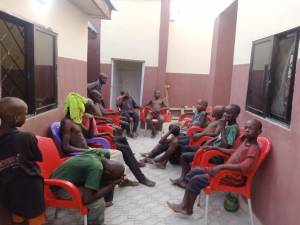
YAFODA key part of Kano’s anti-drugs campaign – NDLEA
Mr Abubakar Ahmed, NDLEA’s commander in Kano, confirms YAFODA has been instrumental to the successes his command has recorded over the years in tackling substance abuse, affirming that a huge proportion of his Agency’s intelligence reports from communities are sourced through NGOs, since people are more comfortable relating information on drugs to groups like YAFODA.
“Aside from information sharing, NGOs also proffer dynamic solutions for tackling substance abuse in the state, based on which we have been recording positive results. In terms of rehabilitation and creation of awareness, YAFODA is at the forefront and I sincerely commend them for their effort because they have significantly aided the reduction in substance abuse in Kano.’’
Mr Ahmed credits the decline in the number of drug abuse cases to the collaboration between NDLEA and NGOs such as YAFODA, noting that if other NGOs in the state would collaborate with the current ones working against drug abuse, a huge proportion of Kano’s drug-related challenges would be taken care of. “YAFODA have been really helpful; they are part of our success story in Kano,” he concluded.
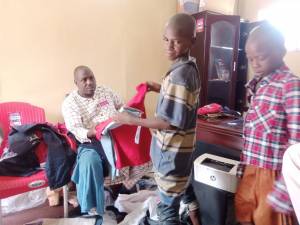
YAFODA’s solution to drug menace
Abubakar Maitumaki, an ex-drug addict, is the founder of YAFODA, the non-profit leading the onslaught against drug abuse in Kano and across northern states. YAFODA’s is a multi-stakeholder approach to fighting substance abuse, working closely with NDLEA, traditional and religious leaders, the Hisbah, amongst others.
YAFODA’s operations commenced 10 years ago in Kano before its innovative approach was successfully replicated across 14 other northern states and neighboring Niger Republic. Thanks to its one-on-one, school-based, and door-to-door campaigns, the nonprofit has effectively sensitized tens of thousands of youths against drug abuse and rehabilitated thousands of others like Tijjani and Dudu across the region.
Maitumaki describes as one of his proudest moments a statewide school sensitization campaign targeting 50,000 students from different LGAs of Kano by engaging 500 pupils from each school at different intervals; the sensitized pupils eventually committed to sharing the message with their friends across their respective communities.
“We achieved this outcome by getting 10 persons from each LGA to provide us with data on the drug abuse situation in their localities, based on which we identified thousands of drug addicts across Kano state. We eventually rehabilitated 1,000 addicts and reunited most of them with their families and relatives. One of the secrets behind our success is: we do not discriminate or treat addicts with disdain – we show them love and care,’’ he explains.
While YAFODA’s approach to solving the drug abuse challenge in northern Nigeria has proven to be largely successful, their reach is limited by lack of funding and the fact that its work is supported by the sheer tenacity of its founder and few dedicated philanthropists. While there are no questions as to the effectiveness and replicability of YAFODA’s interventions, there are obvious concerns about the sustainability of their far-reaching interventions.
This story has been made possible by Nigeria Health Watch with support from the Solutions Journalism Network, a nonprofit organization dedicated to rigorous and compelling reporting about responses to social problems.

